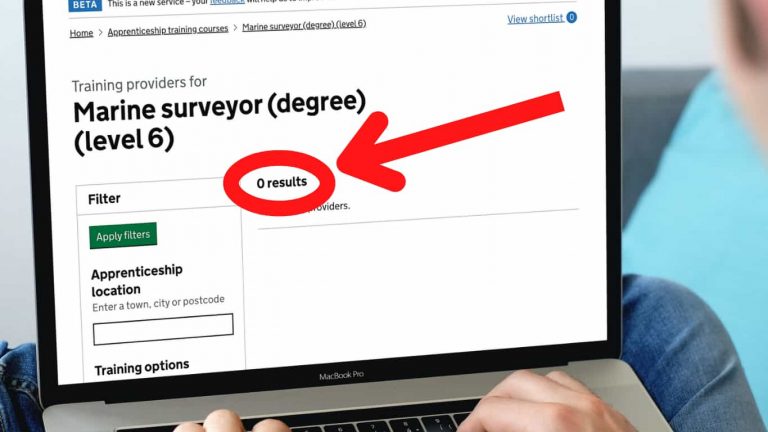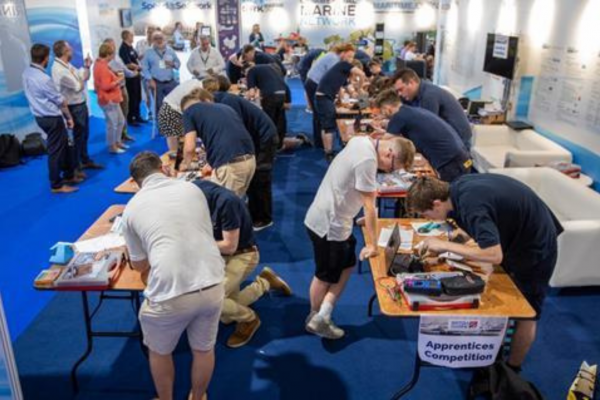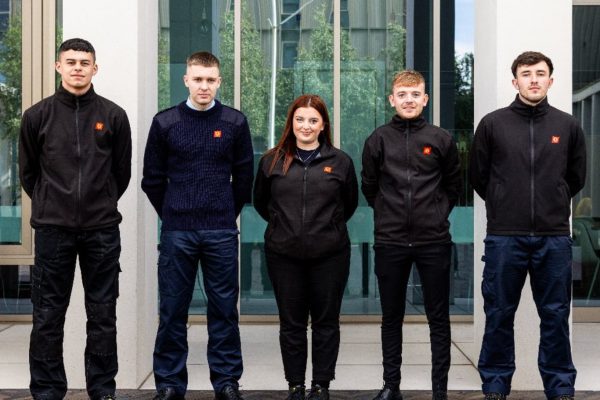There are no training providers in the UK providing the Marine Surveyor (Degree) (Level 6) Apprenticeship.
Marine surveying is essential to the maritime industry as it ensures vessels comply with safety standards and regulations. However, there is growing concerned about the lack of qualified surveyors as there is not a single training provider in the UK offering the Marine Surveyor Apprenticeship.
This apprenticeship teaches individuals the necessary skills and knowledge to provide independent verification, inspection, or examination of a vessel’s structure, machinery, equipment, and systems, ensuring they meet the required standards.
The fact that no UK training providers offer this apprenticeship is a significant cause for concern for the industry and the potential apprentices who could benefit from it. In this article, we will explore the issue of the lack of Marine Surveyor Apprenticeships in the UK, its implications for the industry, and possible solutions to the problem.
This is a significant gap in the industry as individuals who want to pursue a career in this field may not have access to the necessary training.
Furthermore, the shortage of qualified surveyors may lead to safety risks and potential long-term implications for the maritime industry. The question is why there are no training providers in the UK offering this apprenticeship and what can be done to address this gap in the industry.
Background
Shoreside Maritime Training Magazine is an independent trade publication in Maritime Training, giving impartial advice to seafarers at various stages of their careers.
As part of a project to provide training advice on apprenticeships in the maritime sector sparked by National Apprenticeship Week 2023, Shoreside have begun to create a comprehensive prospectus for apprenticeships in the maritime industry.
Looking to give an overview of the provider for each type of apprenticeship, the team at Shoreside we shocked to find out that despite its publication in 2019, not a single training provider is offering the Marine Surveyor (Degree) (Level 6) Apprenticeship.
In response to outreach from Shoreside for comment Ian Biles, Managing Director at Maritime Services International, who provides both services and training in the maritime surveying industry, expressed a lack of surprise in the findings saying “there is no incentive for experienced surveyors to train juniors”, citing poor retention post qualification as a likely reason for a lack of uptake by employers. Ian went on to say that a company training an apprentice to this level are “in effect training their own competition.”
Implications
The lack of Marine Surveyor Apprenticeships in the UK has significant implications for the maritime industry. From safety risks to the potential shortage of qualified surveyors, it’s clear that action needs to be taken to address this gap.
Shoreside reached out to a number of leading organisations within the Surveying sector for comment, including Mike Schwarz, CEO of the International Institute of Marine Surveying, who personally contributed to the agenda-setting forward the apprenticeship standard in Marine Surveying. Many others declined to comment.
Compliance Issues
One of the primary concerns is the shortage of qualified surveyors, which may lead to safety risks and potential long-term implications for the industry. As the number of ships and vessels operating in UK waters continues to grow, there is a greater need for qualified surveyors to ensure their safety and compliance with regulations.
Concerned for the safety of seafarers, Mike Schwarz, CEO of the International Institute of Marine Surveying, stated, “For years, marine surveying has remained an unregulated space, and anyone can practice, unlike that of a house surveyor, for example. This remains a major challenge for the industry.” when approached by Shoreside for comment.
Mike Schwarz continued, “There is no appetite for regulators to regulate the marine surveying business. I am in the early stages of developing a worldwide marine surveying accreditation scheme. Mentoring is another issue too.”
Career Blockade
Another concern is that the absence of Marine Surveyor Apprenticeships may deter potential candidates from pursuing a career in this field. Without access to the necessary training, individuals interested in marine surveying may look for opportunities elsewhere or choose to pursue a different career path altogether. This could lead to a shortage of qualified surveyors in the future, with potentially severe consequences for the maritime industry.
In a comment to Shoreside, Mike Schwarz, CEO of the International Institute of Marine Surveying, stated, “I think we always knew that the potential number of employers who would embrace this apprentice scheme would be small. Most surveying practices are one-man bands – sole traders – or work in tiny businesses. It was always hoped that someone like the MCA with a much bigger talent pool might potentially want to adopt such a scheme.”
Lack of Specialists
The lack of training providers also means the industry is missing out on an opportunity to develop and train its workforce. Marine surveying is a growing field that requires specialised skills and knowledge, and investing in apprenticeships could help to ensure a steady supply of qualified surveyors in the future. Without this investment, the industry may struggle to find the necessary expertise to support its growth and development.
Concerned about the lack of growth in specialisation, Mike Schwarz, CEO of the International Institute of Marine Surveying, stated, “The idea of the apprenticeship scheme was to give people a knowledge base that they cannot easily obtain, unlike in time gone by when working in a boatyard or with a boatbuilder was a good route into the industry.” when approached by Shoreside for comment.
Solutions
The lack of Marine Surveyor Apprenticeships in the UK is a three-way chicken-and-egg situation. Without training providers, there can be no apprentices. Without demand from employers, there can be no positions to fill. Without marketed opportunities, there can be no candidates.
To address this gap in the industry, a comprehensive approach is necessary, one that involves a range of stakeholders, from training providers to employers to potential apprentices. The following list includes some possible solutions to this issue, but it’s important to remember that each approach is interconnected, and a long-term strategy will require cooperation and collaboration from everyone involved.
Here are some steps we propose towards the solution.
- Encourage existing training providers to offer the Marine Surveyor Apprenticeship by highlighting the demand for qualified surveyors and the potential benefits to their business.
- Work with industry bodies to further develop the framework for the apprenticeship, including the necessary qualifications, standards, and training requirements.
- Seek funding from the government or other sources to support the development of the apprenticeship and provide financial incentives for training providers to offer it.
- Partner with international training providers or industry bodies to adapt successful examples of marine surveyor training from other countries or industries to the UK context.
- Raise awareness of the importance of marine surveying and the opportunities it offers as a career, both to potential apprentices and to businesses looking to invest in their workforce.
- Establish a network of industry professionals and apprentices to share best practices and support the development of the apprenticeship.
- Work with the Maritime and Coastguard Agency (MCA) to increase opportunities within the space.
- Provide additional incentives for experienced surveyors to take on apprentices.
What Can Prospective Candidates Do?
There are still a number of options and opportunities for prospective Surveyors, including distance learning courses in Marine Surveying from organisations such as IIMS, as well as a range of short courses available in the industry, usually applied for directly via the employer site.
In dialogue with Shoreside, Ian Biles, Managing Director at Maritime Services International, stated, “in reals terms, there is a career path into the industry” but that “Marine surveying also needs a degree of life experience […] Our youngest surveyor is in their 40’s.”
Beyond this, if you are looking to take action to encourage training providers and employers to provide the course. In that case, the best course of action may be to reach out to your desired employer and make yourself known as a prospective applicant, showing them that there is demand in this space.
Conclusion
The lack of Marine Surveyor Apprenticeships in the UK is a significant gap in the maritime industry that has implications for the safety of vessels and the industry’s future. This apprenticeship provides individuals with the necessary skills and knowledge to conduct surveys independently, ensuring vessels comply with safety standards and regulations. The absence of training providers means that potential candidates may not have access to the necessary training, leading to a shortage of qualified surveyors in the future.
The solutions listed above provide a range of possible strategies for addressing this issue, from encouraging existing training providers to offering apprenticeships to seeking funding and partnering with international training providers. However, it’s clear that a comprehensive approach is necessary, one that involves cooperation and collaboration from training providers, employers, and potential apprentices.
The maritime industry is growing, and the demand for qualified surveyors will likely increase in the coming years. Investing in apprenticeships is an investment in the industry’s future, and it’s essential to take action now to ensure that we have the necessary expertise to support its growth and development. By working together, we can bridge the gap in the industry and provide the training and opportunities necessary to meet the demand for qualified marine surveyors.




